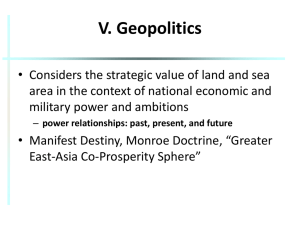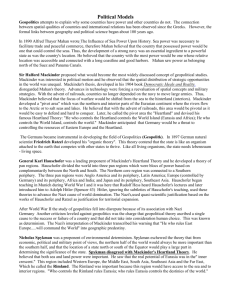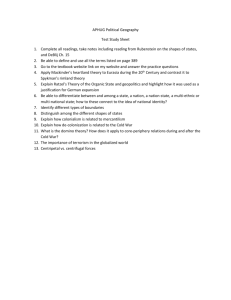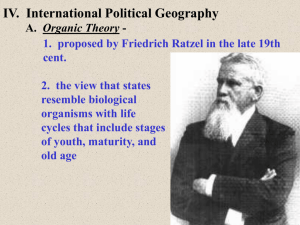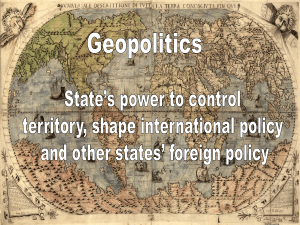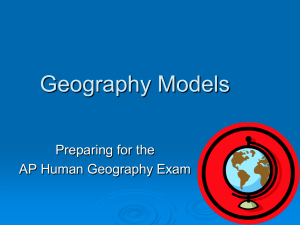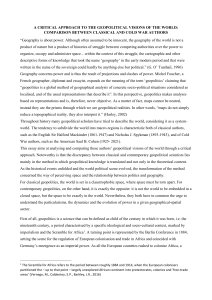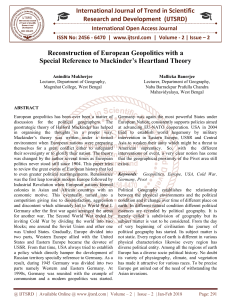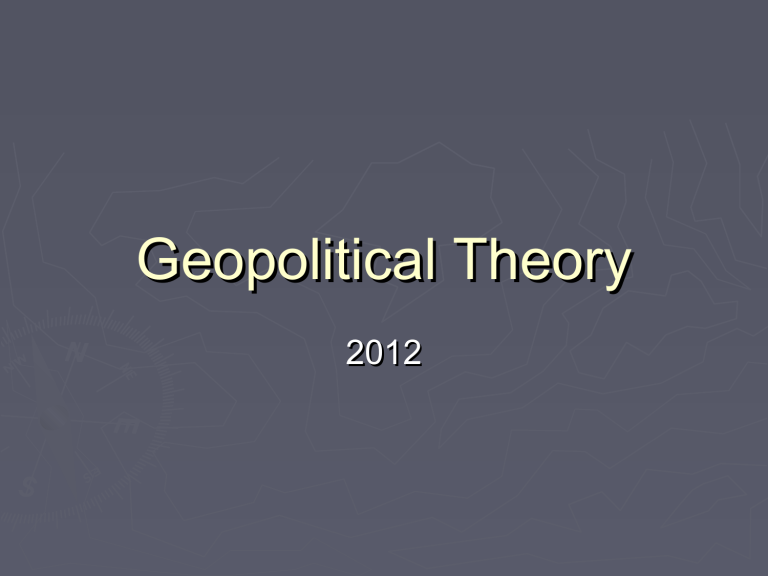
Geopolitical Theory 2012 What is Geopolitics? ► Geopolitics The study of power relationships past, present, and future The study of the relationship among politics and geography, demography, and economics, especially with respect to the foreign policy of a nation. A branch of political geography that considers the strategic value of land and sea area in the context of national economic and military power and ambitions What is Geopolitics? ► Geopolitics The state’s power to control space or territory and shape the foreign policy of individual states and international political relations Geopolitics is concerned with how geographical factors, including territory, population, strategic location, and natural resource endowments, as modified by economics and technology, affect the relations between states and the struggle for world domination. Geopolitics is defined as a branch of geography that promises to explain the relationships between geographical realities and international affairs. Alfred Thayer Mahan: 1890 ► sea power necessary to facilitate trade and peaceful commerce ► the country that possessed power would be one that could control the seas ► development of a strong navy was an essential ingredient to a powerful state as was the country's location ► most power would be held by a country with accessible relative location and connected with a long coastline and good harbors ► power held north of the Suez and Panama Canals. Mahan Ratzel: 1897 ► "organic theory“ ► the state is an organism attached to the earth that competes with other states to thrive ► state requires lebensraum - living space ► must devour other territories to achieve this goal Sir Halford Mackinder: 1904 ► ► ► ► ► ► ► unequal spatial distribution of strategic opportunities in the world advent of railroads released countries from dependence on Navy to move Army focus of warfare would be shifted from the sea to the hinterland "pivot area“ northern and interior parts of the Eurasian continent where the rivers flow to the Arctic or to salt seas and lakes railroads would make this area easy to defend and hard to conquer Heartland Theory: "He who controls the Heartland controls the World Island (Eurasia and Africa); He who controls the World Island, controls the world." believed Germany would be a threat to controlling the resources of Eastern Europe and the Heartland. Mackinder Mackinder Hauschofer: abt 1914 ► proponent of Mackinder's Heartland Theory ► identified three pan regions ► pan regions were north/south situated blocs of power Anglo America/Latin America Europe (German dominated)/Africa and India Japan/Southeast Asia Hauschofer: abt 1914 Nicholas Spykman: abt 1942 economically, politically and militarily, the northern half of the world would always be more important than the southern half, and that the location of a state north or south of the Equator would play a large part in determining the significance of the state ► contrary to Mackinder's Heartland Theory ► both sea and land power were important ► the real potential of Eurasia was in the “inner crescent” ► ► Rimland: Western Europe Middle East South Asia Southeast Asia and the Far East Rimland was accessible to the sea and to interior regions ► "Who controls the Rimland rules Eurasia; who rules Eurasia controls the destinies of the world." ► Spykman A.P. Seversky: abt 1952 ► air power made land battles obsolete ► whoever controls the skies would be the world power ► U.S. and the U.S.S.R. ► an area of intersection was the “area of decision” ► whoever controlled this area would be dominant Immanuel Wallerstein: 1970’s ► A world system: is a social system, one that has boundaries, structures, member groups, rules of legitimization, and coherence. ► three geographic areas Core: ► advanced areas ► strong state structures and a national culture ► economic powers connected by trade and technology ► exploiters of the periphery Periphery: ► weak states ► dependent on core ► colonial states or states with a low degree of autonomy Semi Periphery: ► act as a buffer between the core and the periphery ► emerging somewhat but still dependent on the core Immanuel Wallerstein: 1970’s
